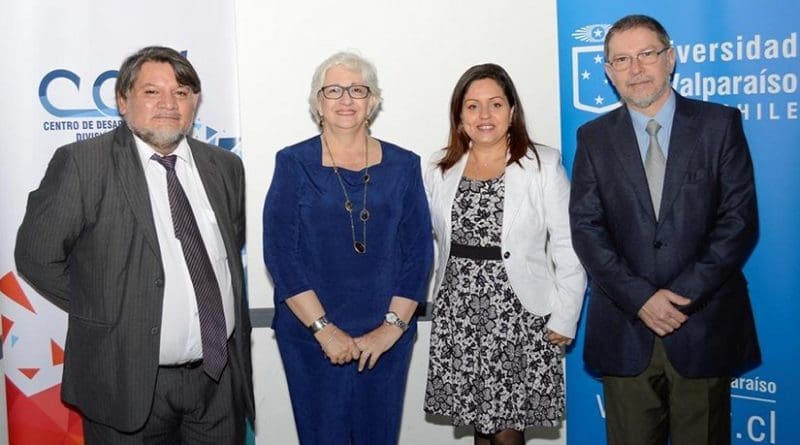Chilean University Hosts Workshop On Engineering Education
By Peter Tase
On November 9-13, 2015 Lueny Morell and Uriel Cukierman arrived at the College of Engineering, Universidad de Valparaiso – Chile, to attend a Workshop and help the University to fulfill the following agreements signed in a Memorandum of Understanding: UVA1311, Equality and Inclusion in Engineering and Sciences; UVA1315, Students come first and UVA1409, STEM in the Faculty of Engineering.
Prof. Lueny Morell is the Co-founder of New Engineering University (NEU), she has a vast academic experience and is recognized as a pioneering leader in engineering education. Prof. Morell has an MS in Chemical Engineering from Stanford University.
Uriel Cukierman, is an expert in Information Systems and has a Masters Degree in Technologies of Information from the Polytechnic University of Madrid (Spain) and an Engineering Degree in Electronics from the National Technologic University (UTN) Argentina. Prof. Cukierman is the IFEES President, Associate Director of InnovaHiEd and is serving as a distinguished research scholar and professor at UTN.
Both experts attended a series of meetings with faculty and staff of the College of Engineering and shared workshops tailored for university professors. In this occasion Prof. Cukierman gave a workshop entitled “Creative Classrooms: ITC and Innovation in Pedagogical Practices” under the framework of II Workshop of Curricular Innovation and Good Pedagogical Practices organized by the Center of Faculty Training.
On November 9-11, Professor Lueny Morell gave a workshop entitled: “Active Methodologies of Learning.” In the first session, she presented methodologies of learning through problem solving and projects based learning; in the second day she focused on a Case Study; and in the last session explained pertinent methods of the Experts’ Game and Team Based Learning.
Upon completion of her workshop, Prof. Morell emphasized that: “every one completed every assigned task. I believe that all are highly motivated to embrace change, actively learning how to do it and are eager to test, tailor and make a second attempt again. I believe that the initiative of the College of Engineering is extraordinary, there is a very clear purpose and we all understand it.”
In the same vein Daniela Soto, a Professor of Industrial Civil Engineering valued the interaction and energy of this workshop she added: “we all felt to be active participants of a responsibility aimed to form new engineers in a different way, where the power point and black board are old school.”
In his workshop Prof. Uriel Cukierman focused on: Technological Resources for Education Based Competencies”. His first session was focused in Educational Technology and Application of Information and Communication Technology in Education; in the second session IFEES President presented the Flipped Learning Model and in the last session
he moderated a dialogue about the virtual environment of teaching and presented scholarly materials online.
When interviewed after his workshop, Prof. Cukierman emphasized: “The number one challenge in many countries is the lack of support from authorities, fortunately this is not the case in this institution; the second challenge is an individual calling which means, having the support of leadership and having appropriate training and now we only have to implement it. There must be a desire to accept errors and correct if this is the case, have the drive to come out of the comfort zone, try to improve the quality of education that we provide.”
For Prof. Luis Escobar, an expert in Industrial Civil Engineering said: “the tools proposed by Cukierman are highly participatory and do not require much time to assimilate them, they require only good will and a good perception of change.” All of the participants were satisfied from the content and innovative topics presented in this workshop.

